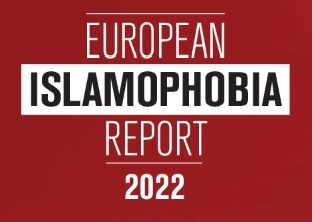The latest edition of an annual “Islamophobia” report falsely claims that Muslim persecution in Europe is ubiquitous, and incorrectly portrays Europe as unsafe for Muslims to practice their faith. The report, which attempts to politicize “Islamophobia,” appears aimed at furthering longstanding efforts by Islamists to criminalize criticism of Islam in the West. The continued publication of these reports, which have been published every year since 2015 by a consortium of civil society NGOs under the influence of Türkiye, indicates that the Islamist campaign to intimidate Western elites and incite Muslim immigrant populations continues unabated even as support for Islamism is declining in the Muslim Middle East.
The main objective is to smash any criticism of Islamism with the Islamophobia club.
Zara Riffler, Germany journalist.
The 2022 edition of the European Islamophobia Report (EIR), a 584-page document, purports to present the “state and tendencies of Islamophobia” in 23 European countries by compiling mostly anecdotal cases of alleged Muslim discrimination into six categories: employment, education, politics, media, internet and justice.
Like the previous seven annual editions of the EIR, the 2022 edition does not provide a precise definition of “Islamophobia.” Instead, it promotes a highly subjective and expansive notion of “Islamophobia” — a notion that falsely views any perceived slight as proof positive of pervasive Muslim persecution and victimhood in Europe.
The EIR is replete with pseudo-scientific terminology such as “subliminal Islamophobia,” “internalized Islamophobia,” “contemporary Islamophobia,” “institutionalized Islamophobia,” “state Islamophobia,” and “undirect [sic] Islamophobia.” It warns of “systematic signaling of Islamophobia,” “systemic Islamophobic practices,” and “potentially Islamophobic situations.”
The report complains about “Islam-skeptical narratives,” “anti-Islam legitimization,” “anti-Muslim propaganda,” “anti-Muslim conspiracy theories,” “anti-Muslim stereotypes,” and “raging Islamophobic battles.” The report also condemns “Islamophobic narratives,” “Islamophobic rhetoric,” “Islamophobic hate speech,” “Islamophobic acts,” “Islamophobic tropes,” “Islamophobic articles,” “Islamophobic content,” and “Islamophobic sentiments.”
An example of alleged “Islamophobia” woven through the 2022 EIR is the subjective assertion that Ukrainian war refugees have been more warmly received by Europeans than have Muslim migrants from Africa, Asia and the Middle East. The EIR claims that the Russian invasion of Ukraine “has uncovered the stereotypical perspective of Europeans vis-à-vis different kinds of refugees.”
According to the EIR, “compared to the problematization of the immigration of Muslims, the debate about white, Christian Ukrainians being naturally welcomed in the rest of Europe revealed the deep-seated prejudice of many Europeans.” In fact, legitimate refugees from the Muslim world and Ukraine have, with few exceptions, been warmly received across Europe.
Another alleged example of “Islamophobia” involves European media coverage of the FIFA World Football Championship, which was held in Qatar in November-December 2022. The EIR asserts that media reports were “Islamophobic and orientalist” because “there was a stereotypical depiction of Muslim women and their treatment according to the customs of certain nations and societies, which were then attributed to Islam as a religion.”
The EIR also claims that it is “Islamophobic” for European history textbooks to examine the often-violent nature of the Ottoman Empire that occupied parts of Europe for 600 years between the 14th and the early 20th centuries.
In Bulgaria, for instance, which was under Ottoman rule for nearly 500 years, the EIR complains that “history textbooks regarding the Ottoman period still preserve most of their Islamophobic characteristics.” Another alleged case of “Islamophobia” occurred when a Bulgarian television station aired a news program — “Diplomatic Pressure Upon Media by Turkish Diplomats” — in which the presenter asked: “There are twelve Muslim embassies in Bulgaria, all of them can and should have a claim on the religion called Islam, but why, exactly, does the Turkish diplomat enter so deeply into the life of Bulgarian Muslims?”
In Denmark, the EIR contends that it was “Islamophobic” for the Danish government to revoke residence permits for Syrian refugees after it determined that it was safe for them to return to Damascus. Another example of alleged “Islamophobia” is that although Muslims comprise roughly five percent of Denmark’s population, Muslims “only occupy 0.15% of the seats in boardrooms and 1.66% of the seats on the board of directors in the 100 largest Danish companies.” The EIR also takes issue with the Danish government’s use of the phrase “non-Western” for census purposes. The term, readers are told, “is politically constructed and often used synonymously with Muslims.”
In Finland, the EIR claims it is “Islamophobic” for students to be required “to speak only Finnish at school.” The EIR also complains that candidates in parliamentary elections drew attention to Finland’s “growing youth violence problem” and argues that “there is a need for greater cultural understanding” on the part of native Finns.
The country report for France was authored by a UK-based specialist on “spatialized Islamophobia” who “focuses on the omnipresence of Islamophobia across spatial scales.” She asserts that it was “Islamophobic” for President Emmanuel Macron — whom the EIR brands as “the world leader of Islamophobia” — to initiate a crackdown on political Islam, which seeks to replace the liberal democratic order with a new political system based on Islam and the Qur’an.
In a basic mathematical error, the EIR’s chapter on Germany falsely claims that more than 70% of Germans “agreed with the statement that Muslims should be banned from immigrating to Germany.” The actual number was 19%. The EIR also accuses well-known German Muslim reformers, “particularly Mouhanad Khorchide and Ahmad Mansour,” of contributing to the increase in “Islamophobia” by “continuously framing” Islamism as “threatening, dangerous, and deviant to democratic structures.”
In Greece, the EIR contends that it was “Islamophobic” for the government to publicly state that “slaughtering animals without anaesthetizing them is unconstitutional and should be forbidden.” It was also “Islamophobic” for the Greek newspaper Democracy to translate into Greek several chapters of Douglas Murray’s recent book — “The Strange Death of Europe: Immigration, Identity, Islam” — about the “disappointing failures” of mass migration and multiculturalism.
The EIR informs readers that in Hungary, 2022 was a “rather peaceful year as far as Islamophobic incidents are concerned.”
In Ireland, the EIR claims it is “problematic” for the media to “co-locate” terms such as “Islamic” and “terrorist.” It was also “Islamophobic” when Muslims in Irish prisons “faced jealousy and often bullying” from other prisoners because they were allowed to celebrate Ramadan.
In Italy, the EIR brands Prime Minister Giorgia Meloni as “Islamophobic” for her pledge to crack down on Islamism and the uncontrolled mass migration that feeds it.
In Kosovo, the EIR informs that the most common form of “Islamophobia” is “internalized Islamophobia,” a “variant of Islamophobia that often goes unnoticed in public debates because of the normalization of an anti-Muslim mindset.”
By contrast, Malta is “very underdeveloped in Islamophobia,” according to the EIR.
In the Netherlands, job candidates who mention on their CV that they are active on the boards of Islamic organizations “have a reduced chance of getting invited to a job interview.”
The author of the country report for North Macedonia wrote that she “received information that when applying for a job, a picture is required in the CV, so women with headscarves have never been called for an interview.”

In Slovenia, the Russia-Ukraine war “exposed double standards and racism” in the treatment of refugees. The war “showed that Slovenia and the European Union have more sympathy and more political will to ensure the protection of those fleeing from Ukraine than for refugees from Syria, Afghanistan, and other crisis hot spots around the world.”
The EIR’s country report for Spain is more of a screed against the so-called far right (the term appears more than 20 times) and efforts to preserve Spanish identity than it is about “Islamophobia.”
In the United Kingdom, the EIR claims that “Islamophobia pervades all aspects of public and private life, all domains of activity, and all spheres, physical and virtual.”
German Islam expert Zara Riffler noted in 2022 that Islamists are deliberately exaggerating discrimination against Muslims in the West to silence critics. “The main objective is to smash any criticism of Islamism with the Islamophobia club,” she concluded.
Soeren Kern is a Middle East Forum Writing Fellow.
